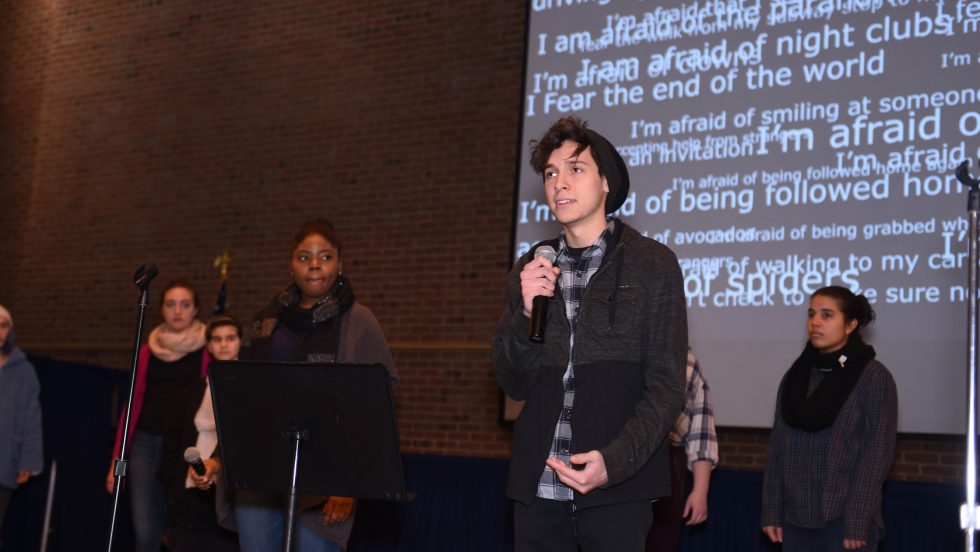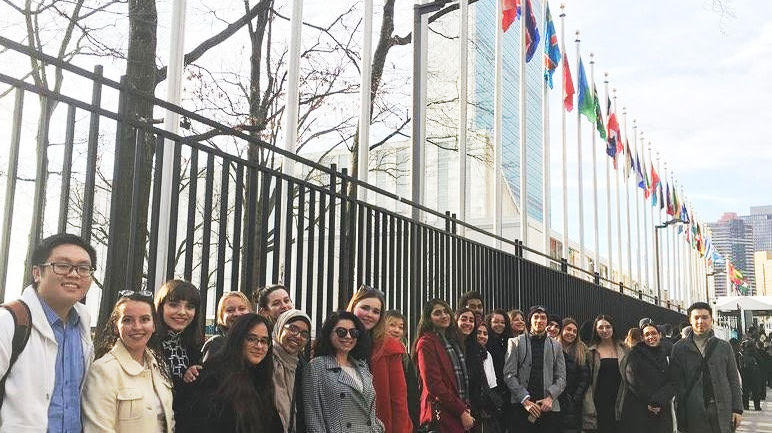
Doctoral students helping refugees seek asylum in the United States. Undergraduates working within the United Nations. A professor who educates the world on the history of the Holocaust.
As the United Nations prepares to celebrate its annual Human Rights Day on December 10, we look at human rights initiatives at Adelphi that are making an impact locally and across the globe.
Helping Refugees Win Asylum
Adelphi doctoral students in psychology are making a mark working with refugees seeking a new life in the United States through the Adelphi Asylum Project. In partnership with HealthRight International, students conduct interviews, perform forensic evaluations and draft affidavits for asylum seekers under the supervision of an Adelphi faculty member. They may also be called as expert witnesses during immigration proceedings, if necessary.
By providing these pro bono services, students help asylum seekers achieve a 90 percent chance of success with their applications. “Many of the people, if returned to their countries, are attacked and killed by the forces that drove them out in the first place,” said Michael O’Loughlin, PhD, a practicing clinical psychologist and professor in both the Ruth S. Ammon School of Education and the Gordon F. Derner School of Psychology, who leads the program. “That’s really the essence of the work. It’s about saving lives.”
Keeping the Past Alive to Fight Intolerance
David Machlis, PhD, associate professor in the Robert B. Willumstad School of Business, is an internationally known advocate for human rights and recent recipient of the first-ever President’s Humanitarian Award at Adelphi. As co-founder and vice chairman of the International March of the Living, Dr. Machlis has spent more than three decades educating global audiences about the history of the Holocaust, bringing groups to Poland to visit concentration camp sites for powerful learning experiences about the consequences of hatred and intolerance. Among those he has shepherded are students, faculty members, deans of laws schools and schools of education, state secretaries of education, diplomats from around the world, and even a group of 16 elderly veterans who had helped liberate concentration camps at the end of World War II—a group that included the soldier who had unlocked the gates of Buchenwald.
When the pandemic made international travel impossible, Dr. Machlis turned his energies to producing documentaries aimed at combating hatred and intolerance. He has completed four since 2020, including Medicine and Morality: Lessons from the Holocaust and COVID-19 and, most recently, Let There Be Light, which focuses on Kristallnacht—the night in November 1938 when Nazis ransacked more than 7,000 synagogues and Jewish-owned stores in Germany and Austria, murdering scores of Jews—while highlighting stories of people who have committed acts of bravery in the face of terror.
Dr. Machlis’ focus on the Holocaust serves a larger purpose. “The Holocaust is not a Jewish issue—it is a universal issue,” he insists. “We must learn from the past so that a more tolerant and just society evolves for the betterment of all humankind. We must embrace the past to ensure our future.” He also encourages all who will listen to stand up and confront hatred and injustice: “We all have a platform, and we all must use it.”
Giving Students Tools to Build a More Just Future

Levermore Global Scholars on one of their many visits to the United Nations.
Celebrating its 15th anniversary this year, Adelphi’s prestigious Levermore Global Scholars (LGS) program has prepared 265 undergraduate students to become global thinkers and leaders, inviting them to participate in human rights seminars, internships, service projects, and events with international leaders, social justice advocates and policymakers. Today, LGS alumni are making positive change in local and global communities. Edwin Maldonado ’13, JD, went on to become senior assistant district attorney of Nassau County and Erica White ’15 spent 27 months with the United States Peace Corps in Madagascar.
“LGS has always been about giving students the tools to help them imagine a better future and actually build it, whether that be in creating new sustainability initiatives, supporting them in their public service internships, or helping them launch community projects that deal with human rights issues,” said Peter DeBartolo, administrative director of the LGS program. “We are really trying to prepare the next generation of health professionals, engineers, social workers, educators, entrepreneurs, journalists and leaders across many different fields.”
Adelphi is also a UN-accredited NGO and a founding member of the United Nations Academic Impact initiative, which aligns educational institutions with the UN’s Sustainable Development Goals. Through this partnership, students can attend international summits, conferences, and briefings at the UN. Adelphi also hosts its own human rights conference for high school students across Long Island, though the conference is currently on hiatus due to the pandemic.
In the New York City area alone, LGS has long-standing partnerships with more than 50 nonprofit organizations, including the P.E.A.C.E. Afterschool Program and New York Communities for Change.
“A lot of students hear about the big ideas, but they don’t actually know how to operationalize those ideas in their local spaces,” DeBartolo said. “LGS provides that, matching students with nonprofit internships and mentors, and facilitating educational opportunities for them so they can bolster their skill sets while also making a substantial impact on their communities.”
For the past few years, LGS students have partnered with the anti-poverty think tank Rock and Wrap It Up and the nearby Cathedral of the Incarnation to launch a food recovery initiative on campus. They collect unsold, prepacked, unexpired food to deliver to domestic violence shelters and homeless shelters throughout Nassau County. In just a 10-month period, the initiative reallocated between $10,000 and $15,000 worth of food.
“Students can attend a climate summit at the UN and then, within a couple of weeks, they’re out there redistributing food that addresses the human rights of an at-risk, marginalized, food-insecure community, while also preventing greenhouse gas emissions by ensuring that good, healthy food doesn’t end up in landfills,” DeBartolo said. “It’s about helping people and the planet at the same time.”
Going forward, Adelphi will continue to expand its role in human rights leadership, providing even more opportunities for students to make an impact in their local and global communities.
“When I think about society and the challenges facing us, I am extremely inspired and encouraged by our students because they reimagine what’s possible,” DeBartolo said. “That in itself is one of the greatest gifts of being involved in [the LGS] program—to constantly be involved with such an amazing community of students who reimagine what’s possible and make it happen.”